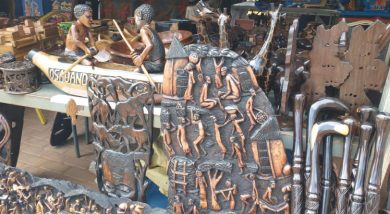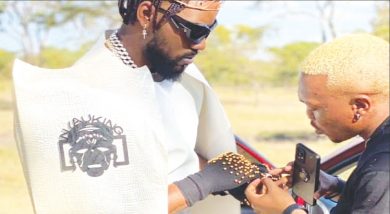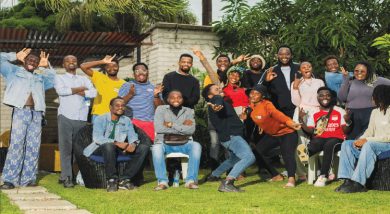Chill
The versatile Ada-D E Davis Musa
Where is that veteran’s deep, catching voice on Malawi Broadcasting Cooperation (MBC) reading news, anchoring outside broadcasts, presenting Afro Beat, Tadzuka Sitidziwa Anzathu, Tidziwane ndi Oyimba, Greetings by Postcard, The Megamix-Kasakaniza and many other programmes? That humorous character people would not have liked to miss for a whole 37 years it paraded the MBC airwaves? YVONNIE SUNDU caught up with Davies Mussa, popularly known as Ada-D E, in Lilongwe recently and this is his story.
Born on March 15 1948, Mussa is an icon of the country’s broadcasting history having worked with MBC for 37 years. Today, after retiring from the mother broadcaster, he still has the love for the airwaves as he is working as the station manager of Maziko Radio Station in Lilongwe where he has been since 2009.
“I went to Chikhutu Primary School where I sat for the Primary School Leaving Certificate of Education examinations in Standard seven because it was the time we were about to receive independence. From there, I proceeded to Likuni Boys Secondary School where I was from 1964 to 1968.
“I didn’t go to college,” he laughs. “After my Cambridge, went to Blantyre. I applied for a job at MBC and they recruited me on June 23, 1969 in the News and Current Affairs Department.”
But the first day is always full of memories: “Obviously, when you’re joining MBC, you’re very excited and at times one gets a different picture on the job. I was nervous because of the machines—you know just coming out of some part of Likuni,” he laughs again, adding there were others who helped him settle in.
He then went into the Engineering Department before proceeding to the programmes’ section.
“Management looked at where I leaned towards and I was therefore sent to the programming section up to 1971. We used to have the schools programmes under the Malawi Correspondence and Distance Education and I was seconded to the MBC’s Schools Broadcasting Unit up until 1973.
“Then there was a vacancy at MBC Zomba offices and after undergoing interviews, I was picked. I did a number of jobs like reporting, presenting and producing programmes and on top of that, I was also selling airtime,” he explained.
In 1975, management liked his presentation on the Three Ways–Zimene Mwatipempha programme he used to present with the likes of Mercy Phiri, now Mercy Chipeta from the North, late Franklin Titani in Lilongwe and James Chimera in Blantyre.
“I was then transferred back to Blantyre where I went straight into the announcers section. I was later joined by the likes of the late Phillip Mwala Moyo. I then underwent a lot of training in terms of presentation skills, programming among many others. A promotion from announcer to senior announcer followed.
In 1991, Mussa attended a three-month course at the British Broadcasting Corporation where he came back with three certificates—drama for development, trainer of trainers and radio production.
He was also at Radio Deutsch Welle in Germany for more training. After his Europe sojourns he was appointed the assistant in the Training Department.
“MBC did not have a training centre. I therefore initiated the centre and helped in shaping up of many people there. Unfortunately, I doubt if the centre is still around,” he wonders.
Mussa left his footprints at MBC as an initiator of the Morning Basket – Thumba la Zambiri together with the current MBC director general Benson Tembo.
“At the same time, late Mwala Moyo and I started Tadzuka Sitidziwa Anzathu and then we became celebrities in those days. These programmes, among others, have over the years remained popular at MBC,” he said.
“I remember doing programmes like AFro Beat, Tadzuka Sitidziwa Anzathu, Tidziwane ndi Oyimba, Greetings by Post Card, The Megamix-Kasakaniza until when I retired in 2004 as acting controller of business at MBC,” he explains.
But what made him popular at MBC?
“One thing most people might have in me is the attitude of making humour part of every conversation. The best stories are those told from everyday activities. Relevance and variety helped me a lot.
“That time we used to greet by calling each other Ada [a Tonga pun]. The late Davis Mapwesera was fond of addressing me as Ada and later added my initials D.E representing Davis Eleazele and that’s how Ada D.E came into being. So, it originated from the slung languages in the townships,” he said, stressing that up to now, it is popular.
Having retired, he found himself at the board of directors for Maziko then later on taken on board as station manager since 2009.
But who motivated or inspired Ada-D E?
“Tony Kandiero, Lucius Chikuni and Elias Kapangama played a role and shaped me to be where I am today. These people spoke very good English, no accent.” Drawing a comparison between the past and the present, Mussa observes that a lot of things have changed.
“The ethics are still the same, yes. But there are differences in the aims for having programmes, times have changed and so things have changed too. But one of the things I observed is that there is now more of a casual attitude than it used to be in the past. People might have knowledge of the job, they might have skills but I’m worried about attitude.
“We are letting silly mistakes happen, because of this casual attitude. People learn a lot through radio but we’re using unsuitable language,” Mussa charges.
“Now you find a presenter saying ‘in the programme, I have a guest who will introduce him or herself and tell you why they are here’. You don’t do that, no way,.
He prides himself to have taught the likes of Patricia Sundu, Code Sangala, Noel Chinkwende, Harold Takomana, Patrick Njawala and Francis Kapiri the ropes of broadcasting.
Mussa says among the things he is probably to be remembered for at MBC, is having taught people to argue professionally.
“It is healthy to do that,” he says.
He wants people to remember him as “someone who contributed to the growth of Malawi through the medium of radio.”
Mussa has four children and comes from Chikhutu Village, Traditional Authority (T/A) Chitukula in Lilongwe District.






